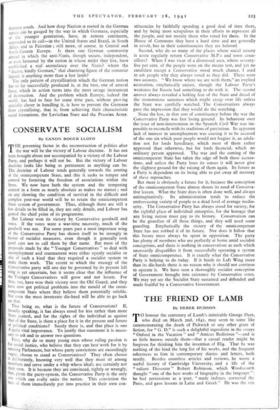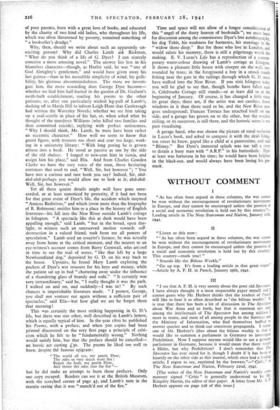THE FRIEND OF LAMB
By DEREK HUDSON TO honour the centenary of Lamb's inimitable George Dyer, who died on March 2nd, 1841, may seem to some like commemorating the death of Pickwick or any other giant of fiction, for " G. D." is such a delightful ingredient in the essays " Oxford in the Vacation " and " Amicus Redivivus "—and is so little known outside them—that a casual reader might be forgiven for thinking him the invention of Eli a. That he was nothing of the kind the long list of his works, and the frequent references to him in contemporary diaries and letters, both testify. Besides countless articles and reviews, he wrote a useful history of Cambridge University, and a life of the " valiant Dissenter " Robert Robinson, which Wordsworth thought " one of the best works of biography in the language "; he had pretensions as a poet, " made indexes, corrected the Press, and gave lessons in Latin and Greek." He was the son of poor parents, born with a great love of books, and educated by the charity of two kind old ladies, who throughout his life, which was often threatened by poverty, remained something of " a bookseller's drudge."
Why, then, should we write about such an apparently un- exciting person? Why did Charles Lamb ask Rickman, " What do you think of a life of G. Dyer? I can scarcely conceive a more amusing novel." The answer lies less in his blameless character—though, as Hazlitt said, he was " one of God Almighty's gentlemen," and would have given away his last guinea—than in his incredible simplicity of mind, his gulli- bility, his glorious absentmindedness. The more we investi- gate him, the more rewarding does George Dyer become— whether we find him half-buried in the garden of Dr. Graham's earth-bath establishment, reading his poems to the other patients; or, after one particularly wicked leg-pull of Lamb's, dashing off to Maida Hill to inform Leigh Hunt that Castlereagh had written the Waverley Novels; whether we see him taking up a coal-scuttle in place of his hat, or, when asked what he thought of the murderer Williams (who killed two families and then committed suicide), replying with perfect seriousness, " Why I should think, Mr. Lamb, he must have been rather an eccentric character." How well we seem to know that gaunt figure, with trousers too short and coat too large, work- ing in a university library: " With long poring he is grown almost into a book. He stood as passive as one by the side of the old shelves. I longed to new-coat him in russia, and assign him his place," said Elia. And from Charles Cowden Clarke we have the very voice of the man, those hesitating sentences that used to end, " Well, Sir, but however "; " You have met a curious and rare book you say? Indeed, Sir, abd- abd-abd-perhaps you would allow me to look at it; abd-abd- Well, Sir, but however."
Yet all these quaint details might well have gone unre- corded, or at least unnoticed by posterity, if it had not been for that great event of Dyer's life, the accident which inspired " Amicus Redivivus," and which (even more than the biography of R. Robinson) entitles him to a place in the history of English literature—his fall into the New River outside Lamb's cottage in Islington. " A spectacle like this at dusk would have been appalling enough," said Lamb, " but in the broad, open day- light, to witness such an unreserved motion towards self- destruction in a valued friend, took from me all powers of speculation." Lamb used an essayist's licence; he was actually away from home at the critical moment, and the nearest to an eye-witness's account comes from Barry Cornwall, who arrived in time to see the trail of water, " like that left by a large Newfoundland dog," deposited by G. D. on his way back to the house. Upstairs, he found Mary Lamb exploring the pockets of Dyer's wet trousers for his. keys and money, while the patient sat up in bed " chattering away under the influence of a thundering glass of brandy and soda." " It certainly was very extraordinary," said he, " I really thought it was the path.
I walked on and on, and suddenly—I was in " By such chances is imperishable literature made. ' I protest, George, you shall not venture out again without a sufficient pair of spectacles," said Elia—but how glad we are he forgot them that morning !
This was certainly the most striking happening in G. D.'s life, but there was one other, well described in Lamb's letters, which is equally typical of him. In the year r800 he published his Poems, with a preface, and when 50o copies had been printed discovered on the very first page a principle of criti- cism which he felt to be " fundamentally wrong." Nothing would satisfy him, but that the preface should be cancelled— an heroic act costing £30. The poems he liked too well to burn, despite the famous epigram: " The world all say, my gentle Dyer, Thy odes so very much want fire ; Repair the fault, my gentle Dyer, And throw thy odes into the fire"— but he did make an attempt to burn those prefaces. Only one copy escaped. Readers can see it at the British Museum, with the scorched corner of page 45, and Lamb's note in the margin saying that it was " snatch'd out of the fire." Time and space will not allow of a longer consideration of this " angel of the dusty heaven of bookstalls "; we must leave for discussion among the connoisseurs Dyer's lost autobiography, his dog Tobit, his weakness for footnotes, his marriage to the " widow three deep." But for those who live in. London, and would salute his memory, there is still a pilgrimage worth the making. E. V. Lucas's Life has a reproduction of a contem- porary water-colour drawing of Lamb's cottage at Islington. It shows a pleasant little house with creeper on the wall, sur- rounded by trees; in the foreground a boy in a smock stands fishing near the gate in the railings through which G. D. must have walked into the New River. If you visit Islington today you will be glad to see that, though bombs have fallen near it, Colebrooke Cottage still stands—or at least did so at the beginning of January. Of course, it has changed a little since its great days; there are, if the artist was not careless, fewer windows in it than there used to be, and the New River now goes underground; Duncan Terrace has attached itself on one side, and a garage has grown on to the other, but the wooden railing, or its successor, is still there, and the historic scene is not past visualising.
A garage hand, who was shown the picture of rural seclusion in Lucas's book, and asked to compare it with the drab Isling- ton street he knew, gaped like a child at a pantomime, and said " Blimey." But Dyer's immortal splash was too tall a story to detain a busy man with " A.R.P." in his buttonhole. Dyer at least was fortunate in his time; he would have been helpless in the black-out, and would always have been losing his gas- mask.



























 Previous page
Previous page